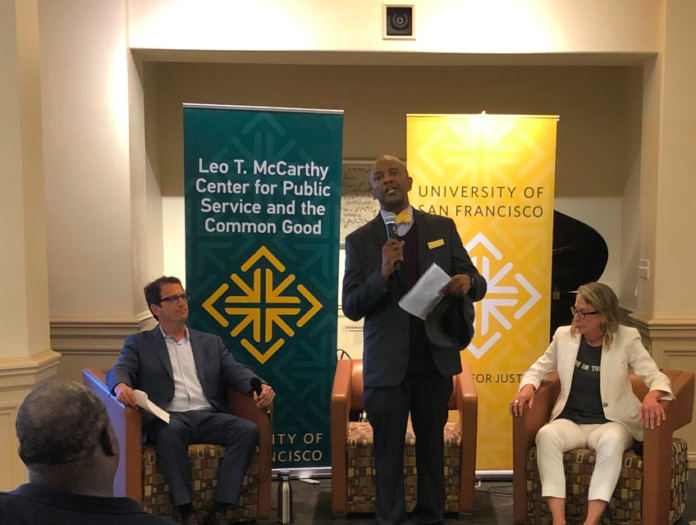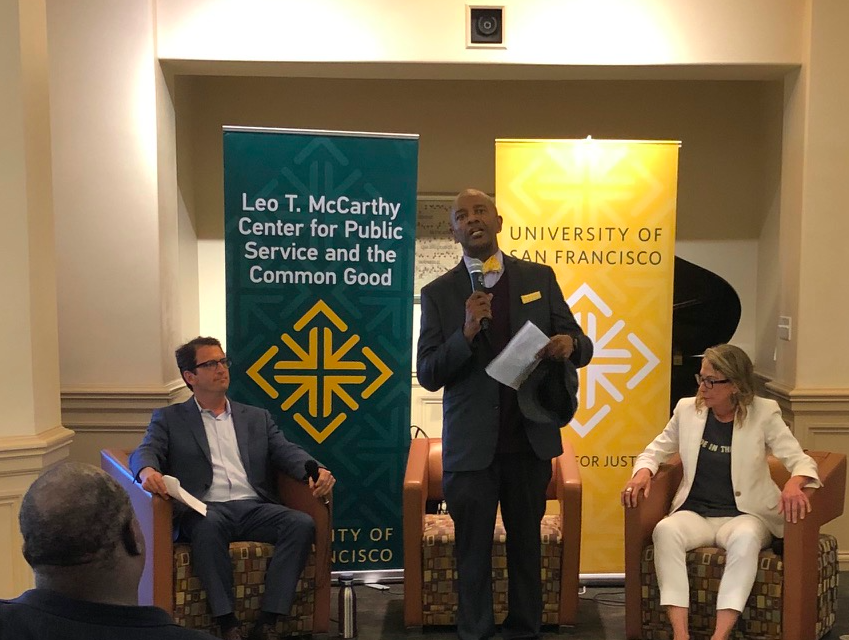
The progressive majority on the Democratic County Central Committee splintered last night.
Although a reform slate was elected in 2016 specifically with the mandate to move away from real-estate-industry control of the party, the candidate for D5 supe who has the support of real-estate won a party endorsement.

By a one-vote margin, the DCCC backed Sup. Vallie Brown and refused to give Dean Preston, who has the backing of every major tenant group and most progressive organizations in town, a shot at a Number Two endorsement.
The mayor’s candidate for district attorney also got the party nod.
Mayor London Breed has been lobbying furiously against Preston, reliable sources have told me. She also made calls supporting Suzy Loftus for DA.
The result was not a big surprise – it’s been clear for several days now that some of the people elected on the Reform Slate were going to side with the mayor and against the tenants and progressive movement that had elected them.
The DCCC Reform Slate members who voted against Preston were Sup. Sandra Lee Fewer and former Sup. Sophie Maxwell. The two members who abstained, and thus lowered the threshold and allowed Brown to win, were Frances Hsieh and Leah La Croix.
Pratima Gupta, who has moved out of the city, resigned from the panel – but not in time for Chair David Campos to appoint a new member.
Help us save local journalism!
Every tax-deductible donation helps us grow to cover the issues that mean the most to our community. Become a 48 Hills Hero and support the only daily progressive news source in the Bay Area.
Preston told me tonight that he would expect the Democratic Party on the national level to oppose his agenda – “they won’t impeach Trump or even have a debate on climate change.”
But the San Francisco party? “I would have hoped for better,” he said.
Here’s what he said on Facebook:
Unfortunately, the SF Democratic Party bowed to the corporate interests that run this town, at least for now.
It was sad and embarrassing to see the local party which should be leading the progressive movement instead endorsing the failed status quo.
That being said, it won’t deter our campaign. We have knocked tens of thousands of doors. Never once has a voter asked us whether the DCCC supports us.
For the next two months, the SF Democratic Party will now become little more than a funnel for unlimited corporate money to flood mailboxes of D5 and city voters.
That, of course, is the key issue: Contributions to local candidates are limited to $500, but anyone can give any amount to the local party, and that money can be used for slate cards and mailers in favor of the endorsed D5 candidate.
I watched a debate tonight at USF with Preston and Brown, and you could see the differences between the candidates pretty clearly. Preston talked about the race as a struggle for the soul of the city, against “real-estate speculation and greed.” Brown talked about her good relations with the mayor and how that would help her improve the district. Preston said that “we have to play hardball” with Uber and Lyft; Brown said that “if we could regulate them we would” but the state has pre-empted that authority. Preston said that the San Francisco City Charter gives the mayor too much power and vowed to “stand up to the mayor.” Brown said that the supervisors have to work closely with the mayor (and she voted against a measure that would have taken control of homeless services away from the mayor and put it under a more independent commission).
Brown, in other words, seems happy with the direction of the current mayoral administration. Preston is not.
So in a sense, this race is a referendum on the policies of Breed and her predecessor, Ed Lee (Breed hasn’t made any dramatic moves different from Lee’s approach, for example, to the tech industry). The mayor knows that; she was the supervisor for D5, and if her appointed incumbent loses, it will be a political loss for her, too.
The members of the DCCC are independent elected officials. They have no obligation to vote the way the chair, or anyone else, tells them to. That’s the way it should be: There have been times in the past when the Democratic Party in SF was tightly run by a powerful machine, and DCCC members did what they were told.
And the Reform Slate was always a fragile coalition.
But activists I’ve talked to in the past few days say that if there’s something called a progressive movement in San Francisco, and if that movement works hard to elect people with a specific agenda – in this case, to oppose the real-estate industry and promote progressive candidates – and the people elected on that reform slate wind up rejecting what the tenants and the organizers want, there’s a problem. A lot of organizers are angry.
It’s possible that Campos will be able to appoint a replacement for Gupta, and that the party next month could reconsider whether, in a ranked-choice race, to endorse Preston as Number Two. That would again be a very close vote.

